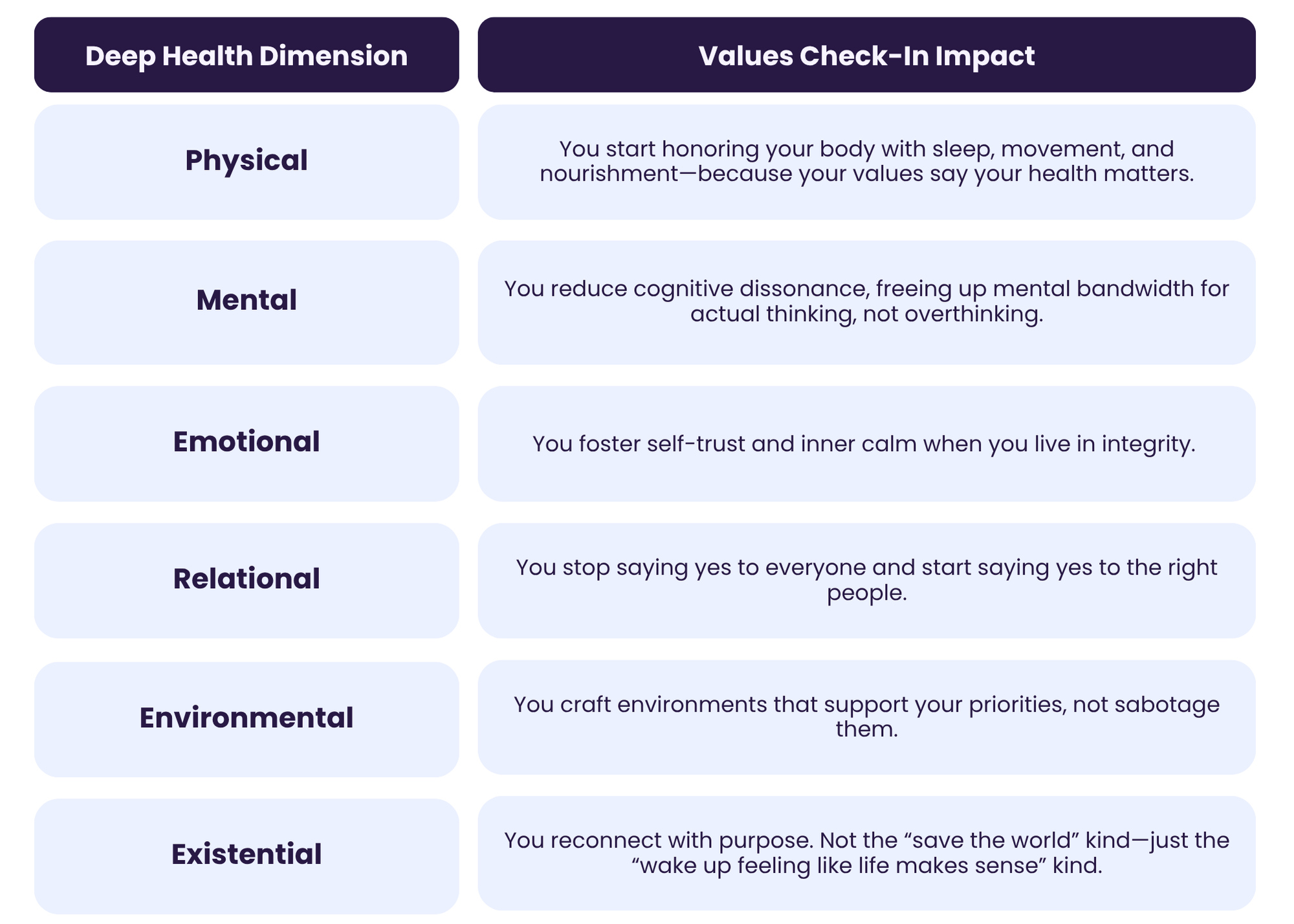The Weekly Values Check-In: A Mental Reset for Burned-Out Overachievers
Don’t lose sight of what truly matters to you.
‘Life moves pretty fast. If you don't stop and look around once in a while, you could miss it.'- Ferris Bueller.
Let’s cut to the chase.
You’re smart. You’re driven. You’ve achieved a lot. But here’s the uncomfortable truth: if you’re not regularly checking in with your values, you’re operating on autopilot—and autopilot is how burnout becomes the norm.
We all know the feeling. Your calendar is jammed, your inbox is a dumpster fire, and your mind is stuck in sprint mode. You’re so focused on surviving the week that you forget to ask the most important question:
“Am I still living in alignment with what actually matters to me?”
When you’re consistently out of alignment with your values, the effects can ripple through every aspect of your life—heightened stress, strained relationships, and a sense of disconnection from yourself. But when you actively check in with your values, you create an opportunity to course-correct, fostering clarity, balance, and emotional resilience.
Why Core Values Matter
Core values are the internal compass that guides our decisions, priorities, and behaviors. They define what we stand for and provide meaning to our actions, especially in the face of challenges. Without a clear understanding of these values, it’s easy to drift, making choices that may lead to short-term gains but ultimately leave us feeling unfulfilled or disconnected.
When you’re clear on your values, you move through life with direction. You don’t waste mental bandwidth overthinking every option. You don’t keep chasing goals that don’t actually matter to you. You know who you are, what matters, and how to make decisions that support both your ambition and your well-being.
Now, let’s flip that. What happens when you’re not clear on your values—or worse, when you ignore them?
You say yes when you mean no.
You burn out chasing goals that don’t feel like wins.
You wonder why, despite all the achievements, something still feels…off.
Example?
Let’s say one of your core values is family, but you’re constantly sacrificing time with loved ones to meet work deadlines. Or maybe you value personal growth, but you’ve been stuck in a role that’s been intellectually dead for a year. That low-grade resentment or restlessness you feel? That’s what misalignment looks like—and it’s a silent, chronic stressor.
The science backs this up. Values alignment has been linked to lower stress, higher life satisfaction, and improved mental health outcomes. According to research published in The Journal of Positive Psychology, people who regularly reflect on their values show greater emotional resilience and a stronger sense of purpose. In other words: knowing and living your values is not just good for your soul—it’s a performance-enhancing strategy.
Why High Achievers Lose Sight of What Matters
Let’s be real: ambition has a dark side. You get praised for pushing limits, hitting targets, staying late, skipping lunch, answering emails at 10 p.m. But slowly—imperceptibly—you start making decisions that serve urgency, not meaning. What started as a values-driven life becomes a to-do-list-driven existence.
You stop honoring your health because the client deadline is “more important.”
You stop nurturing relationships because networking feels more “productive.”
You lose joy, creativity, and mental clarity—because you’re reacting instead of choosing.
It’s not weakness. It’s drift. And the antidote is deliberate recalibration.
Enter: the Weekly Values Check-In.
What the Hell Is a Values Check-In…And Why Should You Care?
It’s easy to lose sight of what matters. A weekly values check-in is exactly what it sounds like: a short, structured reflection that helps you evaluate whether your choices are aligned with your core values.
This simple yet powerful practice is about recalibrating your life so that your actions align with your deepest principles. By dedicating time to reconnect with your values, you not only reduce stress but also cultivate a sense of purpose and fulfillment that sustains you in the long run.
This is a high-leverage habit—what I call a keystone ritual—because it realigns your mental GPS. It helps you:
Get clear on what actually matters to you right now (not five years ago, not what LinkedIn thinks).
Reduce chronic stress by eliminating internal conflict and decision fatigue.
Build resilience by reinforcing purpose and meaning, even when things feel chaotic.
Prevent burnout by reminding you that rest, relationships, and boundaries aren’t luxuries—they’re necessities.
This isn’t about perfection. It’s about pattern recognition and course correction. A good pilot doesn’t wait until the plane is off-course by 500 miles. They adjust every few minutes. So should you.
The Deep Health Connection
If you’ve worked with me before, you’ve heard me talk about Deep Health—the idea that real wellness spans six dimensions:
Physical (energy, strength, recovery)
Mental (focus, clarity, mindset)
Emotional (resilience, regulation)
Relational (connection, communication)
Environmental (spaces and systems)
Existential (purpose, meaning)
Your values are the throughline connecting them all. Let’s break it down:
The Weekly Values Check-In: A Step-by-Step Guide
Integrating a values check-in into your weekly routine doesn’t require hours of reflection. In fact, just 10–15 minutes can make a significant difference. Here’s how to structure this practice:
1. Set the Stage
Choose a time and environment that allows for uninterrupted focus. Early mornings, Sunday evenings, or the end of a workweek are great opportunities.
2. Review Your Core Values
If you haven’t clarified your core values yet, start with three to five that matter most to you right now—not in theory, but in practice.
Ask:
What drives my decisions when I’m at my best?
What do I want people to feel when they interact with me?
What makes me feel proud—not performative?
(Pro tip: If your core values list looks like a corporate mission statement, start over.)
Examples might include:
Health
Integrity
Curiosity
Connection
Creativity
Autonomy
Impact
3. Reflect on the Week
Now ask:
Did my actions this week reflect my values?
Where did I live in alignment?
Where did I go off-track?
This isn’t about shame—it’s about awareness. You’re the scientist here, not the judge.
4. Celebrate Wins
Don’t skip this. Recognizing where you did show up with integrity builds psychological momentum. Acknowledge the moments when you lived in alignment with your values. This positive reinforcement strengthens your commitment to them.
5. Identify Misalignments
Reflect on where you may have fallen short and explore why. Avoid self-criticism; instead, view these instances as opportunities for growth.
Where did you say yes when you should’ve said no?
Where did you abandon rest, connection, or personal truth to avoid discomfort or please someone else?
Document it without drama. Then ask: What was the payoff? What’s the cost
6. Plan for Alignment
Set intentions for the week ahead. What actions can you take to better align with your values? For example, if “health” is a core value but you’ve been skipping workouts, commit to scheduling exercise sessions as non-negotiable appointments.
Pick one small but specific action that brings you into closer alignment this week. Not 10. Not a full schedule overhaul. One.
Examples:
“I will keep my workout appointment with the same respect I give client meetings.”
“I will log off at 6 p.m. two nights this week, no guilt allowed.”
“I will decline the extra project because it clashes with my boundary around burnout recovery.”
That’s it. Rinse and repeat weekly.
7. Anchor the Practice
Tie your values check-in to an existing habit, like journaling, your weekly calendar review, or a mindfulness practice. Consistency is key.
Real Talk: Why Most Professionals Don’t Do This
Let me guess your objections:
“I don’t have time.”
“It feels indulgent.”
“I’m already behind on actual work.”
All valid. Also wrong.
You don’t have time not to do this. Because if you don’t reflect weekly, you will drift monthly, misalign quarterly, and hit burnout annually.
And here’s the kicker: the cost of misalignment isn’t just emotional—it’s measurable.
Lower productivity
Poorer decision-making
Increased reactivity
Higher turnover (of jobs, relationships, or health)
This ritual is an ROI move. Period.
Real-World Example: A Tale of Two Professionals
Consider two professionals with similar roles and ambitions.
Jane
Never misses a deadline.
Constantly says yes.
“Forgets” to eat lunch.
Lives by her calendar but feels exhausted by it.
Achievement looks good on paper but feels empty in her gut.
Alex
Equally ambitious.
Spends 15 minutes every Sunday doing a values check-in.
Says no to shiny opportunities that don’t serve long-term goals.
Schedules workouts like board meetings.
Prioritizes meaningful conversations over Slack messages.
Alex’s secret weapon? Weekly realignment. Their life feels as good as it looks.
The Ripple Effect of Living in Alignment
Alignment isn’t just a personal win. It’s contagious.
Your team feels your clarity.
Your relationships deepen.
Your health stabilizes.
Your stress response lowers.
Your leadership sharpens.
When you show up values-aligned, you stop performing life and start living it.
Start This Week (No, Really. This Week.)
You don’t need a new planner. You don’t need another productivity tool. You need clarity. And clarity comes from stopping long enough to ask: “Is the way I’m spending my time, energy, and attention still aligned with who I want to be?”
That’s it.
If it is—great. Double down.
If it’s not—adjust.
Start small. 15 minutes. Once a week. No fluff. No excuses.
Final Thoughts: TL;DR for the Chronically Busy
Burnout often stems from misalignment, not just overwork.
Weekly values check-ins are a high-leverage habit for stress reduction and clarity.
Just 15 minutes of structured reflection each week can improve decision-making, resilience, and fulfillment.
This is a practice for leaders, not a luxury for dreamers.
Your challenge: Schedule your first check-in. Block it off like it’s your most important meeting—because it is.
Your values are the foundation of a life that doesn’t just look successful—but feels like success.
And you deserve both.
Need Help? You’ve optimized everything—except how you feel.
If success doesn’t feel like success anymore, it’s time to get curious. Not tougher.
Let’s untangle the habits that helped you perform—but are now keeping you stuck.
📅 Book your free strategy session. We’ll figure this out, together.
Article References
The sources cited in the article:
Brene Brown. "Living into Our Values.” Brene Brown - Living into Our Values
Harvard Business Review (HBR). “How to Find, Define, and Use Your Values.” HBR - How to Find, Define, and Use Your Values
Forbes. “Why Knowing Your Values is Key to Career Fulfillment.” Forbes - Why Knowing Your Values is Key to Career Fulfillment
Brainfirst Institute. “Aligning with Values: The Neuroscience of Value Based Actions.” Brainfirst Institute- Aligning with Values
Harvard Business Review (HBR). “How to Live in Alignment with Your True Values.” HBR - How to Live in Alignment with Your Values







